
Ally McBeal is an American legal comedy drama television series created by David E. Kelley and produced by David E. Kelley Productions and 20th Century Fox Television. Kelley and Bill D'Elia were the series' executive producers.

The comedy film is a film genre that emphasizes humor. These films are designed to amuse audiences and make them laugh. Films in this genre typically have a happy ending, with dark comedy being an exception to this rule. Comedy is one of the oldest genres in film, and it is derived from classical comedy in theatre. Some of the earliest silent films were slapstick comedies, which often relied on visual depictions, such as sight gags and pratfalls, so they could be enjoyed without requiring sound. To provide drama and excitement to silent movies, live music was played in sync with the action on the screen, on pianos, organs, and other instruments. When sound films became more prevalent during the 1920s, comedy films grew in popularity, as laughter could result from both burlesque situations but also from humorous dialogue.
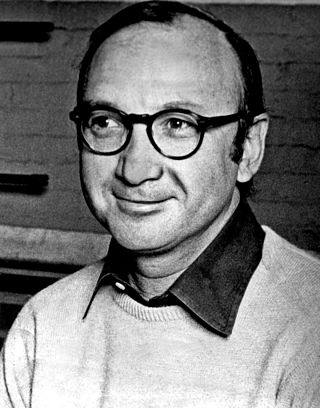
Marvin Neil Simon was an American playwright, screenwriter and author. He wrote more than 30 plays and nearly the same number of movie screenplays, mostly film adaptations of his plays. He received three Tony Awards and a Golden Globe Award, as well as nominations for four Academy Awards and four Primetime Emmy Awards. He was awarded a Special Tony Award in 1975, the Kennedy Center Honors in 1995 and the Mark Twain Prize for American Humor in 2006.
Romantic comedy is a sub-genre of comedy and romance fiction, focusing on lighthearted, humorous plot lines centered on romantic ideas, such as how true love is able to surmount all obstacles.
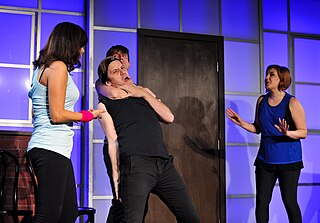
Sketch comedy comprises a series of short, amusing scenes or vignettes, called "sketches", commonly between one and ten minutes long, performed by a group of comic actors or comedians. The form developed and became popular in vaudeville, and is used widely in variety shows, comedy talk shows, and some sitcoms and children's television series. The sketches may be improvised live by the performers, developed through improvisation before public performance, or scripted and rehearsed in advance like a play. Sketch comedians routinely differentiate their work from a “skit", maintaining that a skit is a (single) dramatized joke while a sketch is a comedic exploration of a concept, character, or situation. Sketch comedy is a genre within American television that includes a multitude of schemes and identities.

A comedian or comic is a person who seeks to entertain an audience by making them laugh. This might be through jokes or amusing situations, or acting foolishly, or employing prop comedy. A comedian who addresses an audience directly is called a stand-up comedian.

The Office is the title of several mockumentary sitcoms based on a British series originally created by Ricky Gervais and Stephen Merchant as The Office in 2001. The original series also starred Gervais as the boss and main character. The two series were broadcast on BBC Two in 2001 and 2002, totalling 12 episodes, with two special episodes concluding the series in 2003. A follow up movie staring Gervais and featuring his David Brent character was released in 2016.

Futurama is an American animated science fiction sitcom created by Matt Groening for the Fox Broadcasting Company and later revived by Comedy Central, and then Hulu. The series follows Philip J. Fry, who is cryogenically preserved for 1,000 years and revived on December 31, 2999. Fry finds work at the interplanetary delivery company Planet Express, working alongside the one-eyed mutant Leela and the robot Bender. The series was envisioned by Groening in the mid-1990s while working on The Simpsons; he brought David X. Cohen aboard to develop storylines and characters to pitch the show to Fox.
Comedy drama, also known by the portmanteau dramedy, is a genre of dramatic works that combines elements of comedy and drama. In television, modern scripted comedy dramas tend to have more humour integrated into the story than the comic relief common in drama series but usually contain a lower joke rate than sitcoms.
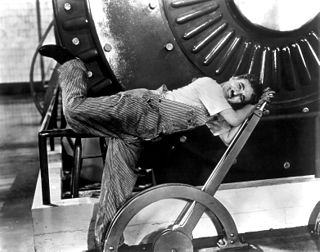
Physical comedy is a form of comedy focused on manipulation of the body for a humorous effect. It can include slapstick, clowning, mime, physical stunts, or making funny faces.

Mr. Show with Bob and David, also known as Mr. Show, is an American sketch comedy television series starring and hosted by Bob Odenkirk and David Cross. It aired on HBO from November 3, 1995, to December 28, 1998.
A recurring character is a fictional character, usually in a prime time TV series, who frequently appears from time to time during the series' run. Recurring characters often play major roles in more than one episode, sometimes being the main focus. They may be contrasted with "regular" characters, who typically appear in every or almost every episode of a series. Recurring characters appear less frequently than regulars, but more frequently than guest star characters, who may appear in only one, two or more episodes without being expected to return.
A film adaptation is the transfer of a work or story, in whole or in part, to a feature film. Although often considered a type of derivative work, film adaptation has been conceptualized recently by academic scholars such as Robert Stam as a dialogic process.

Comedy music or musical comedy is a genre of music that is comical, comedic or humorous in nature. Its history can be traced back to the first century in ancient Greece and Rome, moving forward in time to the Medieval Period, Classical and Romantic eras, and the 20th century. Various forms of comedic musical theatre, including "musical play", "musical comedy", "operetta" and "light opera", evolved from the comic operas first developed in late 17th-century Italy. Popular music artists in the 20th century interested in comedy include Allan Sherman, Frank Zappa, Tiny Tim, Barenaked Ladies, Randy Newman, and "Weird Al" Yankovic. Artists in the 21st century include Tenacious D, Flight of the Conchords, The Lonely Island, Ninja Sex Party and The Axis of Awesome.
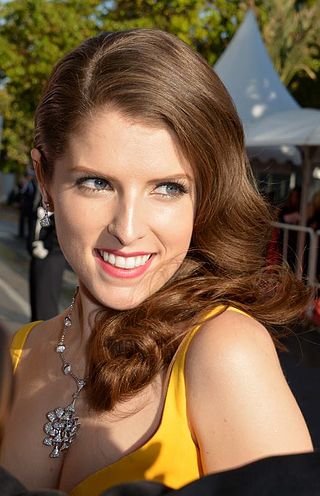
Anna Cooke Kendrick is an American actress. Her first starring role was in the 1998 Broadway musical High Society, for which she earned a nomination for the Tony Award for Best Featured Actress in a Musical. She made her film debut in the musical comedy Camp (2003) and had a supporting role in The Twilight Saga (2008–2011). She achieved wider recognition for the comedy-drama film Up in the Air (2009), which earned her a nomination for the Academy Award for Best Supporting Actress, and for her starring role in the Pitch Perfect film series (2012–2017).

A sitcom is a genre of comedy that centers on a recurring cast of characters as they navigate humorous situations within a consistent setting, such as a home, workplace, or community. Unlike sketch comedy, which features different characters and settings in each skit, sitcoms typically maintain plot continuity across episodes. This continuity allows for the development of storylines and characters over time, fostering audience engagement and investment in the characters' lives and relationships.

Comedy is a genre that consists of discourses or works intended to be humorous or amusing by inducing laughter, especially in theatre, film, stand-up comedy, television, radio, books, or any other entertainment medium. The term originated in ancient Greece: In Athenian democracy, the public opinion of voters was influenced by political satire performed by comic poets in theaters. The theatrical genre of Greek comedy can be described as a dramatic performance pitting two groups, ages, genders, or societies against each other in an amusing agon or conflict. Northrop Frye depicted these two opposing sides as a "Society of Youth" and a "Society of the Old". A revised view characterizes the essential agon of comedy as a struggle between a relatively powerless youth and the societal conventions posing obstacles to his hopes. In this struggle, the youth then becomes constrained by his lack of social authority, and is left with little choice but to resort to ruses which engender dramatic irony, which provokes laughter.
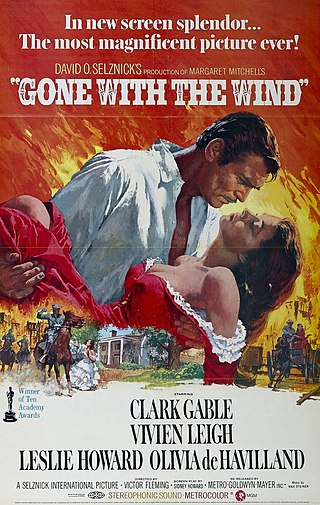
In film and television, drama is a category or genre of narrative fiction intended to be more serious than humorous in tone. The drama of this kind is usually qualified with additional terms that specify its particular super-genre, macro-genre, or micro-genre, such as soap opera, police crime drama, political drama, legal drama, historical drama, domestic drama, teen drama, and comedy-drama (dramedy). These terms tend to indicate a particular setting or subject matter, or they combine a drama's otherwise serious tone with elements that encourage a broader range of moods. To these ends, a primary element in a drama is the occurrence of conflict—emotional, social, or otherwise—and its resolution in the course of the storyline.

A play is a form of drama that primarily consists of dialogue between characters and is intended for theatrical performance rather than mere reading. The creator of a play is known as a playwright.
Television comedy is a category of broadcasting that has been present since the early days of entertainment media. While there are several genres of comedy, some of the first ones aired were variety shows. One of the first United States television programs was the comedy-variety show Texaco Star Theater, which was most prominent in the years that it featured Milton Berle - from 1948 to 1956. The range of television comedy has become broader, with the addition of sitcoms, improvisational comedy, and stand-up comedy, while also adding comedic aspects into other television genres, including drama and news. Television comedy provides opportunities for viewers to relate the content in these shows to society. Some audience members may have similar views about certain comedic aspects of shows, while others will take different perspectives. This also relates to developing new social norms, sometimes acting as the medium that introduces these transitions.















